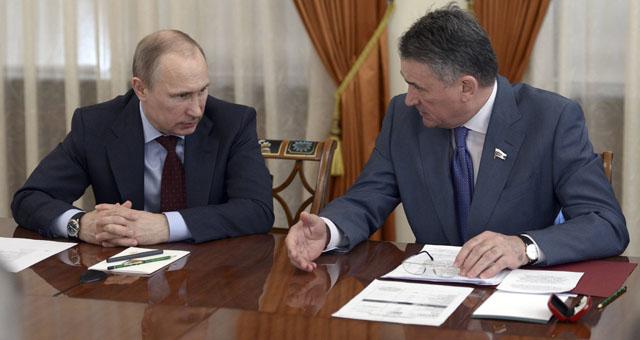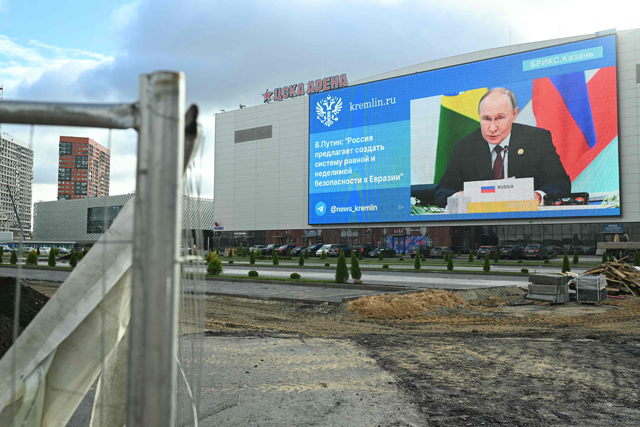You are here
Putin tells West Moscow will develop own card payment system
By Agencies - Mar 27,2014 - Last updated at Mar 27,2014

NOVO-OGARYOVO, Russia — President Vladimir Putin said on Thursday that Russia would develop its own credit card system to reduce reliance on Western-based companies and soften the potential blow from US and European union (EU) sanctions.
Putin voiced his support for plans described by senior officials to create a domestic-based system in response to restrictions placed on Russian banks last week by Visa and MasterCard, which are widely use by Russians.
"We certainly must do this, and we will do it," Putin told senior Russian lawmakers during a meeting that mainly focused on efforts to integrate the Crimea region after he signed legislation to make it part of Russia last week.
Visa and MasterCard last week stopped providing services for payment transactions for clients at Bank Rossiya, under US sanctions over what the West says is Russia's illegal annexation of Crimea from Ukraine.
The two payment systems also suspended services for clients at several other banks whose shareholders are on the US sanctions list. They resumed services after the US government said this did not mean the banks were subject to sanctions.
"It is really too bad that certain companies have decided on ... restrictions," Putin said, without naming Visa or MasterCard. "I think this will simply cause them to lose certain segments of the market — a very profitable market."
Russia has been largely integrated into the global economy since the 1991 collapse of the communist Soviet Union, but the biggest confrontation since the Cold War has led officials to look for ways to reduce reliance on the West.
After hitting Russian officials and lawmakers with visa bans and asset freezes over the annexation of Crimea, the US and EU are threatening measures affecting entire economic sectors if Russia escalates the crisis.
Western states have emphasised they do not recognise Crimea as being part of Russia, but Putin — his popularity boosted by the acquisition — has pressed ahead with steps to integrate the Black Sea Peninsula.
"We must do everything as swiftly as possible so that those who live in Crimea... feel like fully-fledged citizens of the Russian Federation," Putin told the senior lawmakers.
Separately, Russian officials have dramatically reduced growth forecasts for this year and acknowledged the annexation of Crimea will spur capital outflows and hurt investment, but they have not ripped up the old script entirely.
At an investment conference on Thursday, Russia's central bank head and finance and economy ministers were sanguine, boasting they had ways to protect the economy against the fallout from the worst East-West standoff since the Cold War.
Most would not have to be used, they said, and the crisis over Crimea could eventually help the economy become more self-sufficient, a message which chimes with Putin's longstanding drive to bring money home from abroad.
But while sticking to a protocol agreed last week with Putin for all public comments to refer to economic and financial stability, Russia's three leading financial officials were clearly making preparations for the worst.
Having already stopped referring to the official growth forecast for 2.5 per cent this year, Economy Minister Alexei Ulyukayev said it could instead slow to 0.6-0.7 per cent if capital flight reached $100 billion this year.
The economy ministry has estimated capital outflows of up to $70 billion in the first quarter alone.
"[With] an outflow of $150 billion, growth becomes negative," he said, suggesting Russia could tumble into recession for the first time since the aftermath of the global financial crisis in 2008-09.
In the first estimate by a leading international body, the World Bank said on Wednesday Russia's economy could contract markedly this year and see record capital outflows of $150 billion if the crisis over Crimea deepens.
It said Russia's gross domestic product (GDP) could shrink by 1.8 per cent, hurt by uncertainty over future measures the West may take to punish Russia for annexing Crimea.
Economists have also said Russia's economy would suffer badly if the price of oil, its main export item, were to fall.
A Reuters poll of analysts on Thursday showed that increasing oil supplies coupled with sluggish global demand will push oil prices lower in 2014, with further falls expected in 2015 and 2016.
Russia's former finance minister, Alexei Kudrin, agreed, saying it was not the sanctions themselves that were damaging the economy but the expectation of more, possibly targeting trade or finance, and also how Moscow would retaliate.
"All this affects the amount of capital outflows and investments. The general atmosphere of uncertainty about Russian policy in these circumstances is also a deterrent," he said.
"My forecast for economic growth is about zero, plus or minus 0.5 per cent," he added, pegging outflows at $150-160 billion.
He noted that this was what it cost to pursue an independent foreign policy and society was so far prepared to agree to such a cost.
"We are paying hundreds of billions of dollars for this, hundreds of billions, and we will see lower GDP growth, investment and revenues," Kudrin indicated.
For now, most officials are at least publicly backing Putin's decision to pursue his strident foreign policy, forcing their financial colleagues to come up with ways to plug the gap.
Ulyukayev urged a loosening in budget funds to help spur investment, possibly from oil revenues.
Finance Minister Anton Siluanov said he was ready to offer companies the same emergency measures adopted during the 2008-2009 financial crisis when the government spent billions of dollars, or about 8 per cent of GDP, bailing out Russia's major banks and companies.
He suggested using funds from the National Wealth Fund, a sovereign fund financed from oil taxes designed to support the pension system, which as of March 1 stood at $87.3 billion.
Central Bank Governor Elvira Nabiullina also promoted a plan to ease borrowing at home, pointing to three-year refinancing for banks secured by state-backed investment projects as a way of reducing reliance on Western finance.
But for the time being, the overall message was relatively upbeat.
"We expect that one of the consequences of these recent events could be an increase in demand for credits inside the country, if access to lending abroad is reduced for companies and banks," Nabiullina said.
Related Articles
Lower oil prices and Western financial sanctions imposed over the Ukraine crisis will cost Russia around $130-140 billion a year — equivalent to around 7 per cent of its economy — Finance Minister Anton Siluanov said on Monday.
The EU imposed additional sanctions Thursday on Crimea, banning all investment and cruise ships from its ports to force home the message the bloc will not recognise Russia's "illegal annexation" of Ukraine territory.
MOSCOW — Russia's central bank hiked interest rates to 21 per cent recently, taking borrowing costs to their highest level in more than two


















